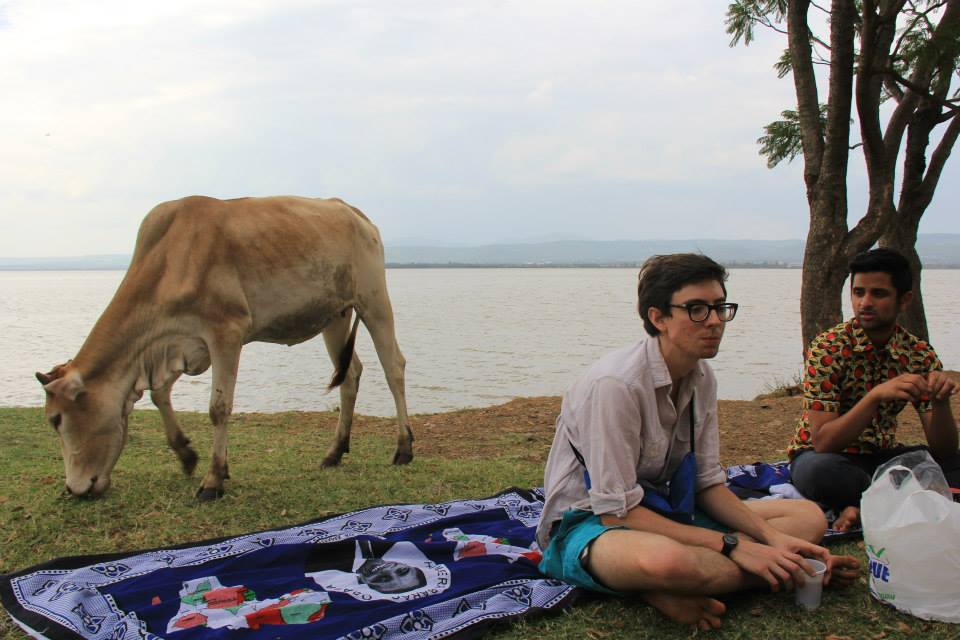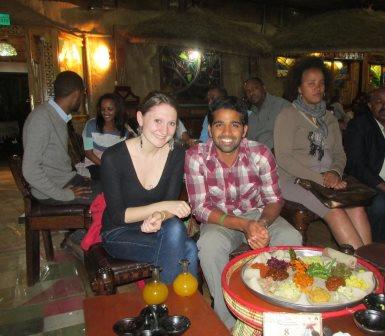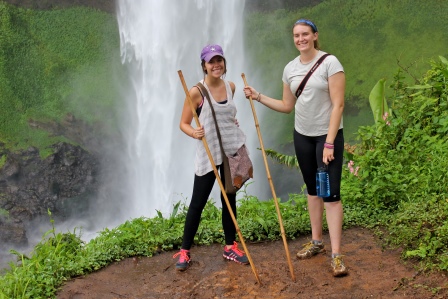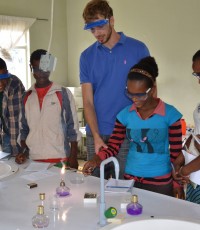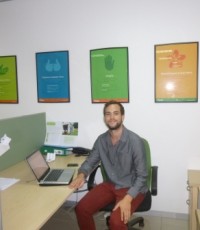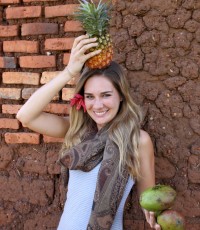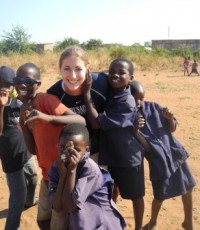January - February 2014
Dear Friends,
Happy New Year! A new year is underway, but our Fellows are as busy as ever assisting our partners across the continent. No matter how different their projects are – from teaching 7th and 8th grade students in a chemistry lab in Ethiopia to organizing free testing and counseling services for World AIDS Day in Mozambique – a common theme emerges: our Fellows have an amazing opportunity to contribute to our partners’ remarkable programming, while experiencing life-changing moments of their own.
As for the PiAf team here in Princeton, the new year is also an extremely busy but rewarding time. Thanks to the many PiAf board members and alumni who devoted their weekdays and weekends to interviewing more than 150 candidates for this upcoming year’s 45-50 fellowship posts. With so many bright, skilled, passionate recent college grads eager to spend a year of service in Africa, we have our work cut out for us. We are excited to finalize our 2014-15 Fellows – and to send a new class of Fellows to support our partners in Africa this year.
We hope you enjoy this edition of the Fellows Flyer!
Katie Henneman
Executive Director
PiAf Connections
Please click below to check out pictures of our Fellows, Alums and other members of the PiAf family meeting up at home and around Africa.
Notes from the Field
By Luke Connell, 2013-14 Fellow with the International Rescue Committee in Kenya
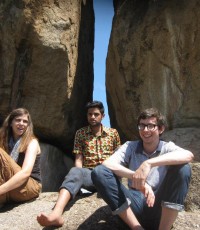
Current 2013-14 Fellows (L-R) Kristen Conroy, Krishnan Raghavan, and Luke take an outdoors photo on Kit Mikayi near Lake Victoria.
Some time ago, my friend asked me at brunch what was the most surprising thing about my time in Kenya so far? It’s a question with many answers! After nearly six months of living in Nairobi and working with the International Rescue Committee – Kenya as a Fellow, there have been many surprises, highlights and stories! So in the spirit of Awards season, the nominees for Most Surprising in a Comedy or Drama are:
+ Nominee: British English and Kenya-isms
The Buzz: For a good Southern boy to suddenly start spelling organization organisation and color colour, it’s pretty surprising. Oh by the way, I now have to search my American English writing to make sure no programmes or centres slip through. Can you imagine?
The Chances: Maybe it’s too indie to win, but it’s changed the way we talk about surprises. It’s a shame it’ll probably be passed over for something more commercial.
+ Nominee: The Landscapes
The Buzz: Mt. Kenya, Rift Valley, Lake Victoria, Ngong Hills — need I say more?
The Chances: It’s the Meryl Streep of nominees. You knew it was going to be good, but you’re still surprised and awed when you see it. I’ve got to call it a front runner.
+ Nominee: The Traffic
The Buzz: An hour to go 3 km.
The Chances: The academy loves a gritty, desperate depiction of misery even though no one actually liked it.
+ Nominee: Nutrition Policy Obsession
The Buzz: After a few months of learning about IRC’s nutrition programmes, I’m so fascinated! The number one book on my reading list is Kenya’s National Nutrition Action Plan (Jem, if you’re reading this, I’m still waiting on my copy!)
The Chances: It’s sort of an obvious surprise, so obvious that it might not even be a surprise—I mean, I love parts of my job, didn’t we all see that coming? This is the obvious commercial contender that might steal a victory from British English and Kenya-isms, but maybe that’s what the voters are looking for?
+ Nominee: Brunch and Yoga
The Buzz: Who knew Sunday Brunch and Monday Yoga would be such a big part of my week? I’ve been lucky enough to make a great group of friends and a lot of our time is spent doing pretty normal things. Like sharing meals, making Oscar predictions, worrying about next year and planning how to watch the Olympics. We just sometimes get to do these things at the foot of the Ngong Hills.
The Chances: Its true-to-life, 20-somethings in a city appeal is strong, and just might ride on Girls‘ momentum for a win.
—
And the envelope please…*drumroll*
What? The envelope’s stuck in traffic, can you imagine?
Notes from the Field
By James Henry, 2013-14 Fellow with Project Mercy in Ethiopia
On my first day in Ethiopia, Meghan [Smith, another current 2013-14 Fellow at Project Mercy] and I were invited to Marta and Deme’s house – the leaders and founders of Project Mercy – for a lunch and orientation. In that moment, which now feels like a surprisingly distant four months ago, I remember Deme telling us that despite the lingering uncertainty of exactly which classes we would be teaching, one thing was certain: we were going to fall in love with the place that we live in. After living and spending almost every day of the past 140 days or so here where the Great Rift Valley meets the edge of the gorgeous Mt. Guraghe, I regularly think back to that first moment and smile at that statement – even though, at the time, I immediately brushed it off with the analytic skepticism I became so accustomed to during college. Not only do I start every day watching as the morning sun bathes a 4,000-foot mountain in deep orange, but I also get to spend my free time hanging out in our science laboratory, playing, or exploring the mountains with the 40 or so equally beautiful “house kids” who live here on the Project Mercy compound. To me, the privilege of being a respected and appreciated member of this community is an amazing added bonus to the opportunity to teach here.
However, as is oft to be in life, great privileges come with great responsibilities. After some shuffling around of duties during the first month, I have settled into the role of teaching grades 7 and 8 Chemistry and grade 5 English, with around 230 students altogether to call my own. Teaching the 8th grade here is a particularly high honor with matching responsibility, as I must do the best I can to prepare the students for the national exam at the end of the year, in which their scores determine whether they will continue their education or be on their own from now on. The importance of reaching these students has also put me on the fast track to Amharic proficiency, as the ability to translate key concepts (for example, የተለይላ ፊደል, የታለይላ እለምንት – different letter, different element) is not only a daily source of laughter for my students, but also important for their comprehension and even greater understanding of English and science. Upon realizing that a staggeringly high percentage of the 5th grade students could not read English at all, I also started a reading/phonics tutorial program after school. The fact that many cannot really speak English also requires me to translate everything into Amharic.
Being a teacher here is not just a day job, but rather a way of life, as every little conversation is a way to reinforce English skills that can mean sink or swim in this country. It is also a job filled with joy and inspiration, as I watch students master difficult concepts in their third language, as well as laughter as we both make frequent errors while getting to know each other better in and outside of the classroom.
Notes from the Field
By Jonathan Kesten, 2013-14 Fellow with Olam International in Mozambique
Many label Mozambique as a country recovering from civil war. But to me, working in Mozambique feels like standing in front of a large, open canvas where the choice of paints is endless. The opportunities for both growth and exploitation make this a critical time for private sector stakeholders like Olam to set standards for fair labor, fair trade, sustainable food, and protection of farmers, who comprise a majority of the economic activity in the country. Especially considering that 45% of land investments fail in Africa due to community conflicts, working from inside this company puts me in a position to enact a lot of change in labor regulations and community engagement.
Since I’ve arrived in Maputo, it feels like I’m learning three different languages at once: Portuguese, corporate culture, and agronomy. The office in lovely Maputo is very removed from the smallholder farms and cotton fields in northern Mozambique. Nevertheless, a post at a multinational agriculture corporation has given me a lot of insight about land use and food production, keeping in mind the downfalls of the industrial American model. I was lucky enough to visit four different factories and processing plants for cotton, cashew and palm oil all around Mozambique, surveying the health and safety standards as we prepare to implement a regional program that will hopefully make Mozambique into a model of how to industrialize without sacrificing the dignity of the individual worker.
As much as I can outside of work, I’ve been exploring the music scene, particularly socially conscious hip-hop. Lusophone countries like Mozambique hold an entirely different history and conception of race and socio-economic intersections. As a global focal point for race relations, music is a language that can bridge gaps of culture and identity. This negotiation of identity was particularly apparent during World AIDS Day. I learned the most when organizing countrywide events to provide free testing, counseling and awareness programs to 650 Olam employees in a country with one of the highest rates of HIV/AIDS in the world. The tone was cheerful – community dances, parades and theater groups set a tone of optimism for the day.
Although Mozambique is experiencing unprecedented turmoil since the end of the civil war in 1992, the equally exceptional influx of foreign investment has left everyone wondering if Mozambique will head in a similar direction to that of “Nigeria or Norway.” I don’t like either of those options – Mozambique has a spirit of activism all its own. As for me, I try to strike a balance between being an outside observer and some type of dynamic youth. Playing futbol, drumming in a band and (of course) enjoying Mozambique’s paradise beaches are my remedies for the stress associated with working in such a transient city.
Notes from the Field
By Lauren Manning, 2013-14 Fellow with Invisible Children in Uganda
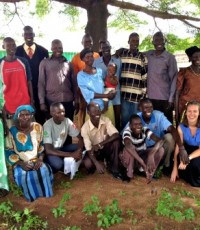
Lauren (front right) pictured with Opondo (top row, in the striped shirt) and his family as they are reunited for the first time in 15 years. Opondo was abducted by the LRA when he was 11.
Every week, I walk around the office, armed with a notebook and a pen, to check in with the program staff. They know what’s coming. “What’s up this week?” If I don’t know what’s going on, our international supporters probably won’t either.
Some days I’m computer-bound – designing documents, organizing databases and writing blog posts. But most days I travel into the field, bouncing along over potholed roads to visit communities throughout northern Uganda. I document our programs, snap photos and gather stories to be shared on the IC blog, social media, and internal and external communications. I spend much of my time talking to beneficiaries – secondary and university students, former child soldiers, war-affected families, and adults learning what it means to save money, to read and write or even, to not be afraid for the first time in years.
Moving here came with three questions from locals and visitors alike — where do you work, when did you get here and when are you leaving? Every expat is stamped with an invisible expiration date. The clock is ticking. It’s odd to recognize that the majority of foreigners I have met will head out before me. We carry a shared experience of moving abroad to this crazy little town, of picking up from wherever we last were to take the plunge and learn more about ourselves and our world. Eventually I’ll be the one with a plane ticket home and will be slowly making a plan for the next step in my life. Like any job, my work comes with frustrations. I’ve sat in meetings that showed me just how difficult it is to run a non-profit. I’ve been discouraged. I’ve been proven wrong. I’ve been disillusioned. I can’t give everyone who asks a laptop or a phone, and just because I am American definitely doesn’t mean that I have Barack Obama’s phone number.
But, in four months, there is a familiarity to everything now. There are people, places and experiences that have made this place feel more like home than I ever expected. I’ve also been inspired and entertained, seen families reunited for the first time in fifteen years, witnessed resilience and had the time of my life. There have been goodbyes, some maybe forever and some for the holidays. I’ve experienced power outages and a mouse infestation, learned how to pick out the perfect watermelon, bought a motorbike, almost bought a cat, and embraced cultural nuances. I am fascinated by the work I’m doing.
I did some traveling around east Africa over the holidays, and it wasn’t easy to drag myself onto the plane, away from my blissful beach life and to board a bus to Gulu. But, after returning, I drove out of the compound on my way to work to the cheers of the friendly boda boda drivers at the end of the street. “Welcome Back!” and “Happy New Year!” they shouted.
It’s a happy new year indeed. Full of possibility.
Notes from the Field
By Allyse McGrath, 2013-14 Fellow with the African Cashew Alliance in Ghana
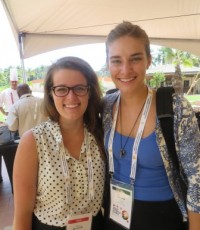
Allyse (left) with Alex Hellmuth (2013-14 Fellow with Olam International in Ghana) at the ACA World Cashew Festival and Expo.
Over the past six months, Accra, Ghana has become a warm (literally and figuratively) home away from home. I have learned more than I could have ever hoped, met amazing people, and grown in a way that is only possible when you remove yourself from the comforts of familiarity. I think that every stage in my life has had a different soundtrack, so I thought I would share with you my favorite soundtrack yet – the sounds and songs that make up my life in Accra:
- Diva Hits: My neighbors (and many Ghanaians) share my appreciation for the world’s great pop divas and often blast the hits of Celine Dion and Whitney Houston. Nothing else has the power to make me feel like I am exactly where I am supposed to be like “I Want to Dance with Somebody” playing on my block when I walk back from work.
- Sewing Machine: My tailor, Ohene (which he always reminds me means “King”) has become a great friend. With the constant sound of his sewing machine in the background, he shares stories and the names and meanings of the fabrics that I bring in.
- Nutty Conversation: I have learned more than I could have hoped about global supply chains, economic development, and agricultural policy during my first six months at the African Cashew Alliance. I have also learned, as you might expect, a weird amount of information about the best nut out there (shameless plug). Step into the ACA office for a day and you will hear the word cashew in four different languages; terms like “Splits,” “Butts,” and “CNSL” (Cashew Nut Shell Liquid), which are all types of outputs from the cashew tree; and discussions of cashew prices at the “farmgate,” “FOB,” and “ex-warehouse.” After having studied agricultural development on a broader scale, I have found it incredibly interesting to focus on one single product and how to transform the value chain for that product. As the Communications Officer at ACA, I work on reporting to donors, distributing market information to ACA Members, and creating newsletters and web content. In my position, I have the unique opportunity and responsibility to monitor all of the different activities of the organization.
- Mediocre Covers of a Variety of Motown and Rock songs: Every Thursday and Sunday night, I live out my high school dreams of “jamming” with friends. I never would have expected that it would take moving to Ghana for me to join a band, but I am loving every second of it.
- Akayida (alternate spelling of Al Qaeda): Referred to by many as the “new Azonto,” Akayida is taking over the popular music scene in Ghana. The Akayida dance is a syncopated sway that is simple and makes me feel, even for just one second, like I can dance like a Ghanaian.
- Silence: I run around the field at the Accra Football Stadium in the evenings. On top of having the benefit of a flat surface, the stadium is incredibly quiet.
Notes from the Field
By Kaitlyn Neuberger, 2013-14 Fellow with World Food Programme in Senegal
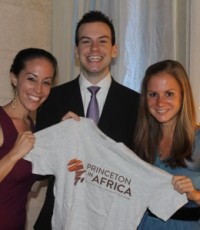
Kaitlyn (left) and fellow 2013-14 WFP Senegal Fellows Ryan Kirlin and Eliza Warren-Shriner at the US Embassy Marine Corps Ball in Dakar.
In my opinion, one of Princeton in Africa’s greatest strengths is the diverse range of Fellows participating in the program. From individuals who have just graduated from college to young alumni who have focused the beginnings of their careers on Africa, Princeton in Africa Fellows approach their positions from an array of viewpoints and bring with them a wide-ranging number of transferrable skills.
In the three years since I graduated from Georgetown University, prior to starting my fellowship with the World Food Programme (WFP) in Dakar, I had been working with the United States Marine Corps as a civilian contractor with their cultural learning center. Even though I loved my job in the defense field, I knew I was ready to explore humanitarian work, and my fellowship has provided me with that opportunity.
When I was preparing to start at WFP, I made several assumptions about which of the skills I had honed through my past professional experiences would apply to my new job. Over the past six months, I have realized that many of the things I didn’t think would be useful in my position have been invaluable and, conversely, many of the professional skills that I had perfected did not translate into my new work context.
Below are two examples of workplace truisms that I learned from my previous positions and attempted to apply to my work with WFP, with varying levels of success.
The best professional email contains no exclamation points, no smiley faces, and as few words as possible.
When working in a military environment, brevity is a highly prized trait, but at WFP this is not the case. Working at the Regional Bureau requires that staff members build relationships with Country Office colleagues who they have never met, and I learned quickly that writing longer, more detailed emails that applauded good work, acknowledged the challenges being faced by the office, and provided the opportunity to ask questions or seek feedback fostered connections and ensured a smoother working relationship.
Professional French is less about having perfect proficiency and more about amassing a field-specific vocabulary.
I previously developed language curriculum that required me to translate phrases like “time on target” into French, which I did not think I would use while working with WFP. While I can’t say that I am providing too much information on the loading and unloading of weapons in French to my current colleagues, I have been required to learn new food security vocabulary in both French and English, and my experience with technical terminology in a foreign language proved to be an unexpected help.
All in all, my fellowship has showed me that you never know what skills you are carrying forward that will serve you in the future. I am certain that many of the lessons I have learned from my time with WFP will shape my professional path in ways I can’t even imagine yet.
Notes from the Field
By Christiana Renfro, 2013-14 Fellow with Gardens for Health International in Rwanda
Nearly six months into my fellowship year in Rwanda, each workday still feels like an adventure into the unknown. Right now, I’m writing to you from Musanze, a district about two hours north of Gasabo, the centrally located district where I live. Gardens for Health (GHI) recently expanded its work into this area, and I’ve been documenting the process with photos, videos, and interviews with our staff and the families with whom we work. Right now, the GHI team is gathered at Shingiro Health Center, awaiting the arrival of over 100 mothers and fathers hoping to be enrolled in our program, many of whom have children who are suffering from severe acute malnutrition. The center is situated in a picturesque area on the cusp of several of Rwanda’s famous “one thousand hills.”
My fellowship organization, Gardens for Health, partners with the Rwandan government, working with eight health clinics nationwide to identify families with children under five suffering from malnutrition. Each season (we don’t have summer and winter in Rwanda, but rather rainy and dry seasons), a cohort of 40 families from each clinic is enrolled in an intensive, 14-week program in which they learn from trained Rwandan field educators about the various factors that contribute to malnutrition, and how to address them. The program delves into health issues such as HIV/AIDS, family planning, and mental health, but holds as its central tenet that a focus on agricultural training is the key to combatting malnutrition in a way that is locally rooted and sustainable over time. One of GHI’s unofficial mottos is: “We begin where food aid ends.” GHI does this specifically by establishing itself within, and working with, specific communities to identify equally specific and sustainable solutions for those most in need.
Soon, I’ll head back via bus to the GHI headquarters in Ndera, located a half-hour outside of Kigali. Our office space, located on a four-acre farm, is used not only as a meeting and coordination site, but also as a space for our agricultural specialists to experiment with new crops and other ideas, which then will be taught to the next cohort of families. So while I sit at my desk banging out blogs, reports, and Twitter posts, I also work on a farm, with chickens, dogs, and small children frequently making an appearance under and around my desk (GHI allows people to bring their children to work, as many of the Rwandan women on staff, in particular, are single mothers).
The best part of the workday, however, is our community lunch program, in which all GHI staff eat food – some homegrown on our farm – together, for free, around an outdoor lunch table. Fresh avocado for lunch every day? I think I can live with it.
Notes from the Field
By Sarah Rogers, 2013-14 Fellow with African Impact in Zambia
I still can’t believe that six months have passed since I arrived in Livingstone. It seems like just yesterday that I woke up for my first day of work and realized I had slept through my alarms and was locked inside my room because my door handle was broken. Not the best way to start my new job as Project Coordinator at African Impact (AI), an international volunteer tourism organization. Fortunately, my supervisor and coworkers were very understanding, and they have continued to be wonderful to work with. Although my first few weeks were a whirlwind, I now feel very comfortable with all of my job’s responsibilities. That includes driving stick shift, in a large van, on the opposite side of the road, through potholes and ditches that flood during the rainy season, with crazy Zambian drivers swerving about!
Working at AI has taught me many valuable skills, including how to handle the inefficiencies of development work in Africa and how to manage individuals of all ages and nationalities. My job involves supervising our community development projects, meeting with community partners and government offices, and creating the weekly schedules for our volunteers and staff. I have designed a new P.E./sports curriculum and reading/literacy curriculum for our primary school programs. I also do fundraising and grant writing for our partner, The Happy Africa Foundation. Although the work can be quite frustrating at times, it’s also very rewarding.
Outside of work, I have really enjoyed my time in Livingstone. The town is filled with people from all over the world who are working in a variety of industries. I’ve met some incredible people and I’ve also formed some amazing friendships. Living here has also provided me with the opportunity to do countless fun activities in my free time. Here is my top 10 list thus far:
- I’ve gone rafting three times on the mighty Zambezi River, one of the best rafting rivers in the world.
- I’ve swum in Devil’s Pool at the top of Victoria Falls and swum underneath the Falls.
- I’ve started learning how to kayak, and I’ve set a goal to kayak some of the Zambezi rapids before I leave.
- I’ve gone to a Polocrosse match (yes, that’s lacrosse on horseback) and a “rowing” regatta where the teams compete in rafting boats.
- I’ve hiked down into the gorge and spent the night camping on the beach under the stars.
- I’ve experienced many different cultural days/evenings filled with Zambian food, dancing and drumming.
- I’ve gone on countless sunset boat cruises.
- I’ve ridden elephants and held baby crocodiles.
- I’ve gone on Safari in Chobe National Park and seen everything from giraffes to baby leopards and lions.
- I’ve gone to more braais (barbecues) than I can count.
I know that I have only eight months left in my fellowship, and although I haven’t figured out what I’m doing next, I am sure about one thing – I want to stay in Africa.


